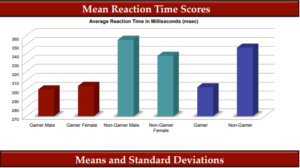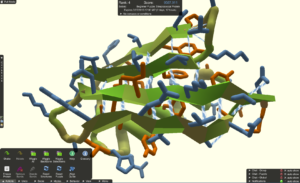The Science Behind Gaming
Hacking into an E-Athlete’s Brain
Super-Human Reactions! Playing Video Games literally changes the
wiring in your Brain.
“Hello, Gamers!
Each one of you must have played some sort of a video game at some point in your lives. Be it Tactical or First-Person Shooters, fantasy games, or even the well-known mobile game “Snake” on the seemingly indestructible Nokia 6110 and in 3310. Although the views of everyone about gaming is starkly contrasting, be it good or bad, there is psychological research providing substantial evidence about how gaming positively affects your brain and improves efficiency in performing tasks involving decision-making, memory, spatial awareness, reaction timings, etc.” There are various reasons why people choose to play video games. Games tend to boost self-confidence, reduce stress, help people socialise over online games or just pass the time (games shouldn’t be the first priority though unless you’re making a career out of it!). Many games also have a good story-line which gets people hooked into playing it. No matter the reason to play, we can all agree that games have become more complex, immersive and addictive over time. Currently, the Video Game industry is booming with talent, inclusive of video game designers, testers and the actual players. The internationally famed ESport tournaments in well-known games like Counter-Strike: Global Offensive, Rocket League, Overwatch, etc. gets attention from professional players and millions of fans alike.
Here are some fun facts!
Why Super-Human reactions?? There was an experimental study called the “Visual Oddball task” performed in Central Washington University, Ellensburg, Washington. This experiment was used to quantify the reaction times of 87 participants aged between 18-40 years, divided into two groups – those who play video games 4+ hours a week, and those who do not. There were 45 females and 42 males who participated in this experiment. Upon completion, the result data showed that the participants who played 4+ hours of games per week,c had an average reaction time of 301.836 milliseconds, whereas, the non-gaming participants had an average reaction time of 346.326 milliseconds. This is a significant decrease in reaction time! The data also shows that the difference between male and female gaming participants did not have much difference in their enhanced reaction times, proving that the result did not depend much on gender. There are several clips on YouTube and Reddit, mostly Esports Tournament highlights, showing video evidence of superhuman reactions shown by First-Person Shooting game players, with reaction times even reducing up to 180 milliseconds! (That’s 0.18 seconds to put things into perspective. Now that’s Super-Human!)

Study:- Reaction Times Differences in Video Game and Non-Video Game Players, Central Washington University.
Between 2010 and 2012, an enzyme catalyst used for Diel’s-Alder reaction, (Don’t worry if you are clueless, I am a chemistry bachelor student, and I still find remembering names of reactions tough!) was developed by researchers. This reaction is used in Synthetic Chemistry for a variety of drug, pesticide synthesis, etc. But the researchers thought that the enzyme they synthesized wasn’t good enough. So, they put up a puzzle on a game called “Foldit” which rewards a higher score to players who synthesize a protein with lower potential energy, which makes the molecule more stable. This is a game where the players could fidget with proteins, submit their protein designs, which would then be tried in the laboratory for its effectiveness. The players actually managed to produce an enzyme which had a staggering 18-fold higher efficiency, even baffling the scientists and left them absolutely clueless. And all this in very less time. Justin Siegel, a post-doctoral biophysics researcher says “I worked for two years to make these enzymes better and I couldn’t do it. Foldit players were able to make a large jump in structural space and I still don’t fully understand how they did it.” Various other proteins have also been designed using this game as a platform.

A protein structure as seen in Foldit. (Source – Google Images)
There have been various visual tests to find out how games affect the visual and oculomotor skills of participants. The gamers that play action games involving precise eye-movement and control along with hand-eye coordination is found to score better in standard visual tests. These results also translate into real-life activities such as driving, sports, etc. A Cognitive scientist from the University of Rochester, Daphne Bavelier tested dozens of participants between 18-25 years of age, irrespective of gender. The group of participants were divided into two groups, one group playing 50 hours of dynamic action games like Call Of Duty 2 and Unreal Tournament, the other playing the slow-paced strategy game- The Sims 2. The researchers made both the groups complete decision-making tasks created by the researchers themselves. These tasks were both visual and auditory in nature. The group that played action games made decisions 25% faster than their strategy game-playing counterparts, with both groups being equally accurate. Daphne Bevelier says, “It’s not the case that the action game players are trigger-happy and less accurate: They are just as accurate and also faster. Action game players make more correct decisions per unit time. If you are a surgeon or you are in the middle of a battlefield, that can make all the difference.” This directly also translates into various day to day situations where one has to make rapid decisions in order to avoid accidents.
In 1989, research dedicated itself to the effects of a game called Space Fortress. This game was specifically developed by cognitive psychologists to train and research its participants. The article in the 1989 issue of Acta Psychologica said that the young players of Space Fortress performed better than controls on a test of physics knowledge. They also say that Israeli Air Force flight school cadets who played the game significantly outperformed the other non-playing cadets in real flight performance.
Here’s what I think!
Most of the action and strategy-based games put the players in a position where, if they want to improve at the game (stagnating is one of the things every gamer hates), they are required to train and develop various kinds of skills such as critical thinking, longer duration of focus and memory retention, faster reactions, bypass strategies, etc. These directly affect real-life as mentioned above. As a First-Person Shooting enthusiast myself, I have found that flicking (a quick and precise movement of the hand and eyes onto a target), micro-adjustment of focus, spatial awareness (a single Molotov can fry you to a crisp if you aren’t aware), strategies have made me into a better driver, helps me find my friends easily in large crowds, allows me to make quicker binary decisions, makes me a better navigator in crowds and traffic (better spatial awareness), better at sports, etc. So overall, not just mentally, games also affect you physically, as per research and my own anecdotal evidence.
So many advantages just from playing Games! But like everything else in life, moderation is key. Games should always be played only for positive activities such as relaxation and should never be prioritised over other activities. I am a marathon enthusiast myself and ensure I finish all my work and exercise before I play any games.
A Healthy Mind in a Healthy Body!
GG GL HF (Good Game, Good Luck, Have Fun) to all you Gamers out there!
Note: These are the personal views of the writer. The writer does not endorse violence or discourteous behaviour of any sort.
Author:

Ajay Malik
A true chemist at heart, Ajay is a chemistry undergraduate from Fergusson College, Pune. He wishes to find a solid cure to one of the most mysterious diseases-cancer. He is not just a curious soul, but also a marathon enthusiast and an avid nature lover.

